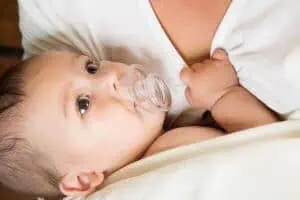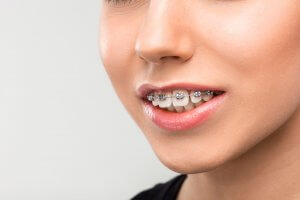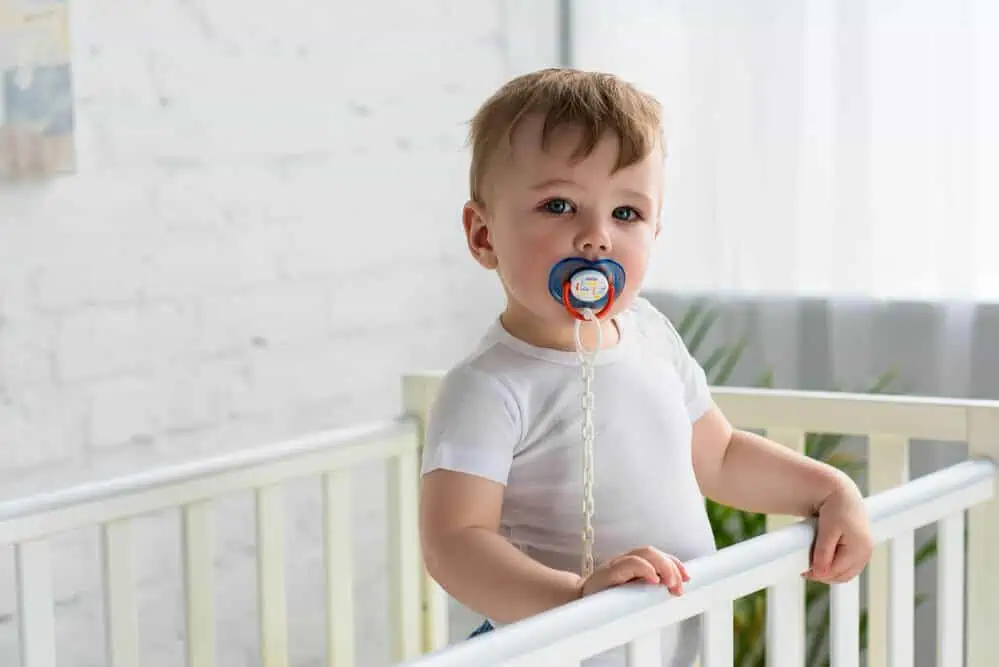Dummies are great for calming children, but prolonged or excessive use may result in the development of a condition known as “dummy teeth“. Having a good awareness of dentistry for babies can be crucial as this condition can have a negative impact on the function of your child’s baby teeth, and even on their adult teeth, as well as on the overall oral health of your child.
As a parent, of course, you want to do the right thing for your child. So in this article, we’ll answer the following questions:
- Does having a dummy affect teeth?
- What do dummy teeth look like?
- Are they reversible?
- Is it ok to give a dummy to a newborn?
- What age should you stop using a dummy to avoid damage teeth?
We hope this information reassures you and helps you make an informed decision about what’s best for you and your little one.
What are dummy teeth?
For a long time, many parents have relied on dummies, or pacifiers, to calm their babies. The soft, nipple-shaped device is comforting for infants to suck on, helping soothe and send them to sleep. But are dummies really a good idea? Some may say no, and one of the primary reasons for this is dummy teeth.

Dummy teeth refers to a condition that occurs from the prolonged use of dummies. The mouth and teeth of a baby start developing in the womb and continue to develop and grow throughout their childhood. During this time, anything kept in their mouth for prolonged periods can negatively affect their oral and dental development.
How can a dummy damage teeth?
Just like a baby or toddler sucking their thumb can lead to children’s oral health problems, dummies can also end up harming and causing changes to their mouth, more than benefiting them. Specifically, the effects of a dummy on teeth can include:
- Crooked or crowded teeth
- Jaw misalignment
- Bite problems, especially an open bite or overjet (buck teeth)
- Protrusion of the tongue
- Changes in the roof of the mouth
- Changes in the position of teeth
These problems tend to become more severe the longer a dummy is used. In some cases, the child will need braces to correct the shape of their jaw and the position of their teeth. That’s why the NHS recommend discontinuing dummy use by age one.

But that’s right around the age that children start becoming attached to their soother – be it a dummy, a blanket or a favourite cuddly toy – so weaning them off their dummy can be easier said than done. We’re not here to make you feel guilty if you’re doing things differently. Up to 75% of babies in the west are said to use pacifiers at some point in their lives, and they certainly don’t all stop by their first birthday.
So, let’s take a look at some of the arguments for and against using a dummy.
Pros and cons of using dummies
Dummy teeth damage is one consideration, but there are plenty of benefits to pacifiers too. As a parent, you’ll have to decide on the best thing for your child. Here are some things to think about.
The pros

The positive effects of a dummy are mostly related to soothing a child. Dummies can:
- Calm a fussy baby
- Act as a temporary distraction
- Ease teething pain
- Distract and soothe a child after a painful procedure such as a blood test or vaccinations
- Help them fall asleep
- Make aeroplane travel easier for babies
Plus, it’s preferable to sucking a thumb or finger, since you can throw away a dummy!
It’s also quite widely accepted that a dummy used before falling asleep reduces the risk of sudden infant death syndrome (SIDS). Sudden infant death syndrome or SIDS is the most common cause of fatalities in babies between the ages of 1 month to 1 year. According to the American Academy of Pediatrics (AAP), pacifiers can reduce the risk of SIDS even after they fall out of the baby’s mouth once they are asleep.
The cons
Despite being a lifesaver for many sleep-deprived parents, there are some potential problems with using a dummy. These disadvantages are listed below and should be considered while deciding whether you want your child to use a pacifier or not.
- May cause nipple confusion in breastfed babies
- Child may become attached to/dependent on the dummy
- Increased risk of ear infections
- Risk of tooth decay if the dummy is coated in anything sweet
- Speech development problems in toddlers who use dummies
- Prolonged use likely to cause a misshapen jaw and misaligned teeth, requiring correction with braces
The later a dummy is introduced to a breastfed infant, the smaller the chances of it interfering with their ability to feed well.
Using a dummy safely
If you do decide to give your child a dummy, here are some ways you can use it safely and stop them becoming too dependent on it:
- Don’t ever force your child to use a dummy. If they are asleep and it falls out without waking up the baby, do not attempt to put it back in.
- Never coat the dummy with anything, for example, sugar or honey, just to encourage the baby to use it.
- Buy orthodontic dummies which are specially shaped to reduce the chances of pushing teeth forward.
- Do not add a ribbon or a tie to the dummy. Moreover, do not tie it to the cot or around your child as this increases the risk of accidental strangulation.
- Always try alternative methods to calm your baby before using a dummy.
- When they start learning to talk, encourage them to remove the dummy and speak rather than grunting or pointing.
What age should you stop dummy use?

Expert advice in the UK says to stop dummy use by age one, or as soon as possible after that. But in other countries, like the US, it’s as late as two, three or even four years old. The greatest risk occurs if your child still has a sucking habit when their adult teeth start to erupt, but at this age it’s thumb sucking that’s a more common problem.
Does your baby use a dummy too much? Are you afraid they are going to develop dummy teeth? Here are some tips to help you both through the process of ditching the dummy:
- If your child is not yet one, start easing them off their dummy now.
- If they are already older, it can help to explain why you’re taking it away.
- Start by limiting it to certain times, e.g. nap time and bedtime, or don’t let them take it out of the house.
- Try substituting it with an alternative comforter, like a blanket or toy, which won’t damage their teeth.
- Encourage them to settle to sleep without their dummy so they don’t wake up in the night crying because they have lost it.
- Try the “dummy fairy” technique described in the video below (her child was 3 1/2):
Do persevere in your efforts, but don’t feel bad if it takes longer than you’d hoped. Your child may have an emotional attachment to their dummy and you shouldn’t expect them to give it up overnight.
Conclusion
Dummies are indeed a great way to calm a crying baby, but when used for too long they can become more damaging than useful. In addition to learning about the pros and cons, it’s not a bad idea to speak with a dentist about your concerns. Remember, dummies can lead to several problems like the development of dummy teeth, which can only be reversed with proper medical care.
Your child’s dentist will monitor their dental health as they grow, and will notify you of any concerns. They may also offer you treatments like fluoride gel and dental sealant to help protect your child’s teeth.
NHS: Help your baby learn to talk. Consulted 11th June 2021.
Pediatrics journal: SIDS and Other Sleep-Related Infant Deaths: Updated 2016 Recommendations for a Safe Infant Sleeping Environment. Consulted 5 March 2020.
Journal of Pediatrics and Child Health: Dummy (pacifier) use and sudden infant death syndrome: Potential advantages and disadvantages. Consulted 5 March 2020.
NCBI: Pacifiers (soothers): A user’s guide for parents. Consulted 20 March 2020.
NCBI: Effects of pacifiers on early oral development. Consulted 25th July 2020.




